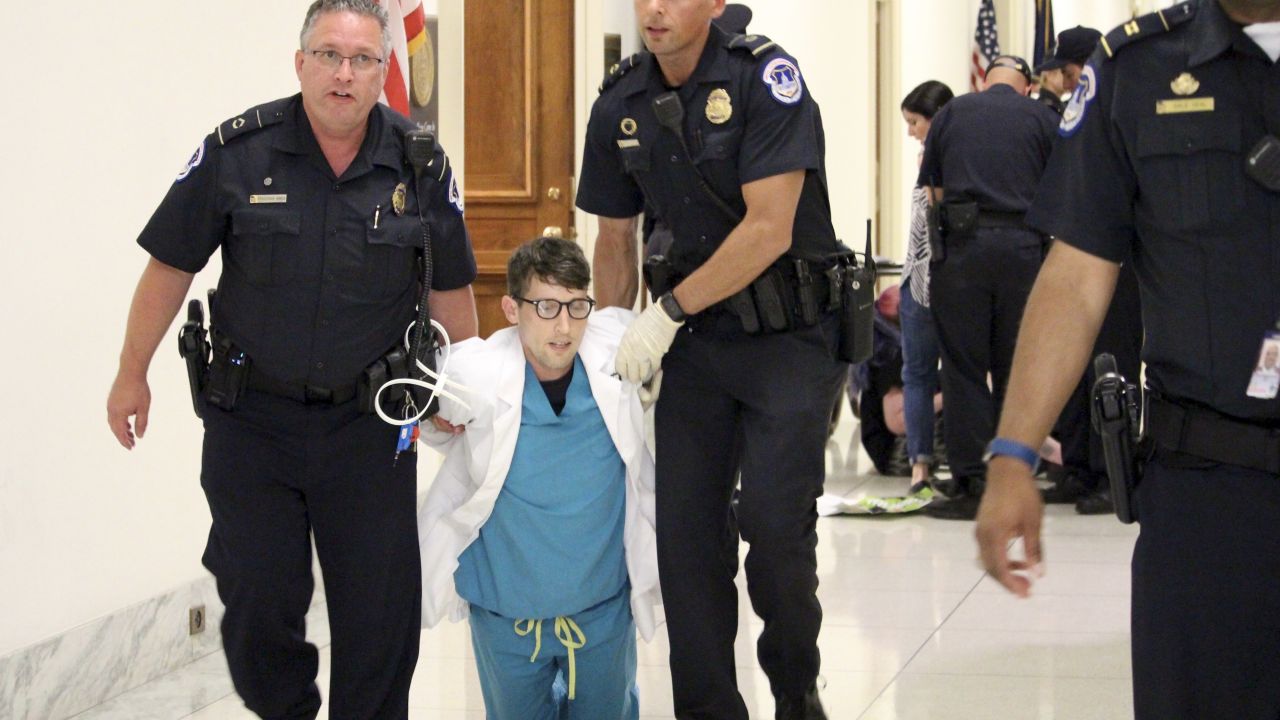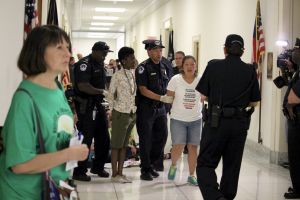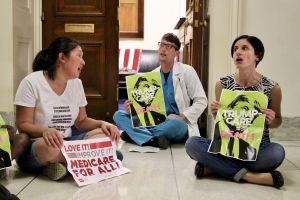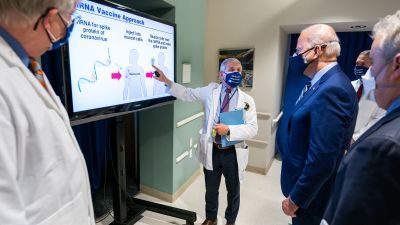
Arrests by Capitol Police at the July 10, 2017 protests over health care on Capitol Hill. (Photo by Emily Marie Ahtunan)
This Q&A is part of Sarah Jaffe’s series Interviews for Resistance, in which she speaks with organizers, troublemakers and thinkers who are doing the hard work of fighting back against America’s corporate and political powers.
Last week, Republican senators returning from their recess were met with a wave of protests against the health care bill. Protests were staged in 13 locations around the House and Senate buildings — some senators were greeted with sit-ins on their very office doorsteps. Capitol police made 80 arrests — one of which was Jaron Benjamin, the vice-president for community mobilization at Housing Works.
Even today, as the bill is dead Benjamin and his cohorts are still in Washington protesting. “We’re glad that BCRA is dead, says Benjamin, “but the White House and Senate leadership are collaborating to repeal without replacing the ACA. We’re mobilizing again tomorrow to send the message, loud and clear, that we deserve much better than that.” Benjamin also sees a light ahead for even better health care. “If McConnell is forced to work with Sen. Schumer and others on ACA repair, we’ll fight to make sure that Washington results in more people covered, fewer out of pocket expenses, and that the quality is on par with what members of Congress receive. We ultimately want universal coverage, and want Washington to move in that direction.”
Last week, Sarah Jaffe talked with Benjamin about his civil disobedience and the issues that led him to Washington.
Sarah Jaffe: You were part of the big day of civil disobedience on Capitol Hill around the health care bill. Tell us about how that went down. I think there’s a pretty dramatic photo of you being carried out by police?
Jaron Benjamin: I think it was probably as impactful for people that participated as it was for people that saw it on the news. I didn’t expect that. I noticed when I talked to people after being released from cuffs was that we all got way more emotional than we thought that we would. It turned out that we were more angry about this attempt to take away health care from millions of people than we possibly knew.
There were a couple of very moving moments during the day. One was when a mother from Arkansas who stood up and very plainly said, “I’m a mother who has children and I’m concerned that if Sen. McConnell and his friends push this bill through I won’t be able to take care of my children that have pre-existing conditions. I’m worried about the safety of my children.” And that really hit home for a lot of folks.
While we were being processed, we were all in cuffs, about 80 of us, and we’re all in the same room and spontaneously people started singing “This Land is Your Land,” and it really underscored just how this protest was a dream of what we can accomplish.
SJ: It seems like health care has the potential to be that kind of issue for a lot of folks who otherwise wouldn’t get involved, wouldn’t risk arrest or just wouldn’t at all see themselves as part of a progressive movement.
JB: It’s important to note that most of the people that got arrested had never been arrested before. The fact that the lives of millions of people are at stake is hard-hitting and important to a lot of people. I think that for people that are concerned about the new president understand that this is the first big thing that he and Senate leadership and Paul Ryan have decided to put on their docket. The longer that this is fought back, pushed back and delayed, the less successful they are going to be and the more of our health care that we will be able to preserve.

Arrests on Capitol Hill, July 10, 2017. (Photo by Emily Marie Ahtunan)
SJ: It’s interesting that you bring that up because there is this tendency — there’s more big Russia news this week — to talk about the demeanor of Trump rather than the policy goals, which are bigger than just Trump. This is Mitch McConnell, it’s Paul Ryan, most of the Republican party seems willing to vote for this thing. We still don’t know how many of them are ultimately going to break.
JB: We can’t leave it up to the chance that some Republicans just of their own volition will decide, this isn’t right, we’re going to break from the party. They’re not going to break from the party unless we get to them with the stories of their constituents and make them understand that this is flying in the face of doing their job.
That is a tall order, but the one thing that Trump has promised, that even some Democrats have said this isn’t such a bad idea, is his infrastructure plan. Well, he can’t figure out how much money he’s going to spend on infrastructure until they figure out how much money they’re going to dole out in tax cuts for the super-wealthy. And they can’t figure that part out until they make huge cuts to the existing budget and the only place that there is enough money and that they would be willing to make big enough cuts is in Medicaid and Medicare. The longer we’re able to delay this, the more we’re able to deal a blow to people who are trying to give tax cuts away at the expense of the rest of us.
SJ: We don’t talk about the way that health care is itself infrastructure, the way that this bill would in fact take away jobs from nurses and home health care aides.
JB: It’s really important for people to be able to one, be employed and two, be connected to health care. Health care jobs, that’s one thing. If you’re talking about investing in your country, if people aren’t healthy, they aren’t healthy enough to work and if they can’t stay healthy, they can’t work. It really derails a lot of what we’re trying to get accomplished.
SJ: I want to ask you to talk a little bit about the history of Housing Works, because Housing Works has been connected to fights around health care for a long time.
JB: Housing Works was founded in 1991 by the housing committee of ACT UP. The idea was if we could have people living with HIV or people with an AIDS diagnosis in housing, then we would be much more successful in stabilizing them, in getting them into treatment. In the early 1990s, maybe even 10 years ago when I started working on the issue, that was kind of a radical idea. Now when they know where they’re going to sleep tonight, they know where their next meal is coming from, they can focus on making sure that they’re taking their meds, making sure that they’re making good health choices.
What we’ve seen as Housing Works has had victory after victory in convincing the New York City and state government to invest more in housing for people living with HIV, more in health services for people living with HIV, and people at risk as well. In 2014 Gov. Cuomo made New York the first state to commit to ending AIDS as an epidemic by the year 2020. That means below 750 new infections by a year, and a lot of other states and jurisdictions have followed suit.

Protesters at Capitol Hill, July 10, 2017. (Photo by Emily Marie Ahtunan)
There are more than a dozen places, like San Francisco, Washington state, Illinois, Minnesota, Texas and Fulton County in Georgia starting to try to figure this out as well. That’s something that we take very seriously, the idea that we can end AIDS as an epidemic even as we don’t have a cure for HIV.
That’s the organization’s history and where we’re headed. I think that everybody involved in those struggles understands that if we lose Medicaid expansion, if people aren’t connected to health care, to routine health care, then our ability to fight HIV as an epidemic really becomes hamstrung. So it is so important to hold on to the health care that we’ve got.
SJ: Tell us a little bit about the coalition that came together for this action and the networks that were at the heart of that.
JB: I think a lot of this started when I read an article about the people who read letters that were sent to President Obama and were responsible for sending him 10 letters a day. My colleague Paul said, “We have to do this. This is what we have to do.” We had to make sure that people that work for elected officials understand the impact that their decisions are having on their constituents. Because that stuff will transfer over to their bosses. It’ll be harder for them to conduct business as usual.
We put out a call to action: if you want us to come out and train you on how to talk to your elected officials and tell your story, whether it’s in a public setting like a town hall or going to their office or it’s at a demonstration, call us and let us know.
Within a few days we had 60 requests from different cities, fast-forward to now: Between three of us, we’ve held trainings, in 25 or 26 states, and have trained more than 1,200 activists since February to tell their stories to their elected officials. A lot of these folks are new activists. They’re just concerned citizens who are really worried about losing their health care. When the repeal of the ACA and cuts to Medicaid became more of a reality instead of a possibility people thought that it’d be a good idea for us just to all converge in Washington, DC and continue to take the message to our elected officials at home.
SJ: And so looking forward, now Mitch McConnell says they’re going to keep working for the first two weeks of the August recess, what’s next?
JB: We’re not going away, that’s for sure. We’re going to, as long as they are threatening to take away healthcare for more than 20 million people. I think that McConnell said something about activist fatigue. Well we don’t have anything left if they take our health care away from us, so we’re not getting tired and we’re not going anywhere. Our lives depend on it.
SJ: How can people keep up with you and how can they get involved?
JB: I think one way to do it is by visiting our website, www.housingworks.org — that’s our organizational site. You can make a donation to us when we decide to send activists to Washington, DC and when we decide that we’re going to risk arrest, that’s kind of expensive, it does cost money — you can sponsor protesters by donating. I think the other thing that people can do, you can email me about how to get more involved at [email protected], to figure out how to get involved, whether it’s getting trained or getting involved in some of the things we’ve got going on both in DC and in districts around the country. Maybe together we can do the impossible which is save the healthcare that we’ve got and maybe even push our elected officials to make improvements to the programs we’ve got now.
You can follow HousingWorks on Twitter: @housingworks.
Interviews for Resistance is a project of Sarah Jaffe, with assistance from Laura Feuillebois and support from the Nation Institute. It is also available as a podcast on iTunes. Not to be reprinted without permission.




